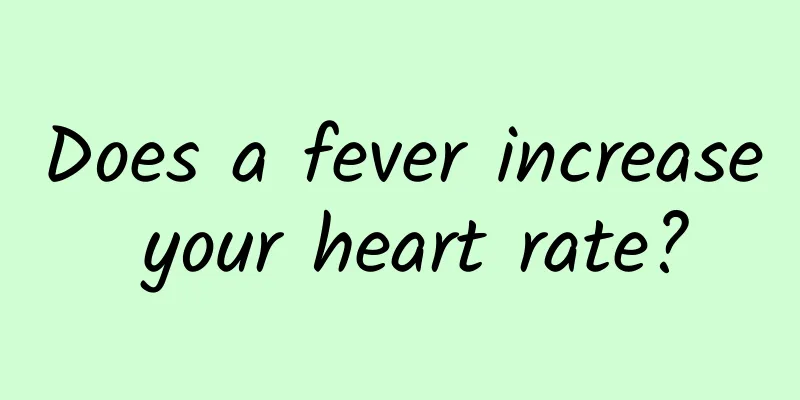Does a fever increase your heart rate?

|
Colds and fevers are the most common diseases in our lives. They may occur if we don't pay enough attention. Sometimes fever can cause loss of appetite, and sometimes body aches. These are all normal reactions of the body. Fever may also cause the heart rate to increase, but the change will not be particularly large. If you have obvious symptoms of palpitations, it is best to consult a doctor. This article introduces the relevant content, let’s take a look. I believe everyone has experienced fever. Even if a person is in good health, there is no guarantee that he will not get sick throughout his life, and colds and fevers are the most common diseases. However, some people will experience a rapid heartbeat while having a fever. Is this dangerous? Generally speaking, people will experience headaches, body aches, chills, or loss of appetite when they have a fever, and relatively few people will experience a rapid heartbeat. 1. Is a fever and a fast heartbeat dangerous? Fever is a normal reaction of the human body to resist disease. The energy source of fever is blood sugar. Only when the heartbeat and blood flow speed up can more glucose and oxygen be transported. A general fever will speed up the body's basal metabolism and increase oxygen demand, so the heart's pumping frequency will increase! It is recommended to control the patient's existing symptoms first. Generally, infants have poor immunity, so it is recommended to go to the hospital for treatment. A faster heartbeat does not matter! If you are still worried, you can also do an electrocardiogram to rule out heart problems caused by viral colds. 2. Exclude Myocarditis If you feel weak after a cold and have a faster heart rate without fever, you should be aware of the possibility of viral myocarditis. Of course, some people may have similar symptoms after a cold without developing myocarditis. To be on the safe side, it is recommended to see a doctor in time and complete relevant examinations to rule out the possibility of myocarditis. There is currently no specific treatment for myocarditis. The main emphasis is on bed rest to reduce the burden on the heart and tissue damage. If accompanied by arrhythmia, the patient should rest in bed for 2 to 4 weeks and then gradually increase the amount of activity. If severe myocarditis is accompanied by cardiac enlargement, the patient should rest for 6 months to a year until the clinical symptoms completely disappear and the heart size returns to normal. Treatments for arrhythmia, heart failure, and cardiogenic shock were used respectively. Immunosuppressants have not achieved universally recognized clinical efficacy and are therefore not recommended for routine use. The use of hormones is still controversial, but hormones can be used for patients with severe myocarditis accompanied by atrioventricular block or cardiogenic shock. If necessary, hydrocortisone or dexamethasone can also be used for intravenous administration. 3. Precautions for fever During illness, eat a light diet and liquid or semi-liquid diet. Do not eat high-protein foods or hairy foods, such as eggs, as they will cause the fever to increase. Make sure the room is quiet and let the child get enough rest. The body's repair process takes place during sleep and only with enough rest can recovery be fast. The indoor air should be fresh, open the windows for ventilation for at least 2-3 hours a day, and the quilt should not be too thick or too much. Drinking more boiled water or vegetable and fruit juice can help promote sweating and urination, and promote the excretion of toxins. Wipe off sweat on your child's body frequently and keep the skin clean to prevent him from catching a cold again. |
<<: There is a lump above the collarbone on the neck
>>: Does a faster heart rate increase blood pressure?
Recommend
The best way to care for your breasts
Breasts are extremely important to women. They ar...
The old man always gets lost. Teach him these little tricks so he won't get lost again
When the elderly reach a certain age, their memor...
Dissociative Personality Disorder
Dissociative personality disorder is also known a...
What is the sign of blushing?
There are many reasons for blushing, including ph...
Xiaoman Health Preservation Chinese Medicine teaches you how to prevent diseases
Grain Full is the second solar term in summer. Fr...
Causes of dry mouth every night
Summer is here, and sometimes it is easy to get a...
Why is it that men cannot ejaculate?
Weak ejaculation is quite common in life. It refe...
What is Qi deficiency? What are the symptoms of male qi deficiency?
Many people think that qi deficiency is only a pr...
How to treat artificial urticaria
Many people should have urticaria. Suffering from...
What to do if you pull a muscle while running?
As people pay more attention to their physical fi...
How to treat spermatorrhea? An old Chinese doctor recommends a few dietary prescriptions
As the saying goes, when semen is full, it will o...
What is moxa stick?
Moxibustion patch is a device used in traditional...
How to take Gardenia Golden Flower Pills
Gardenia and Gold Flower Pills is a relatively co...
What are the characteristics of twin hcg
If a pregnant woman is pregnant with twins, many ...
What are the symptoms of eczema
Eczema is a common skin disease, in which small b...









